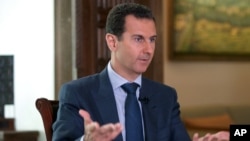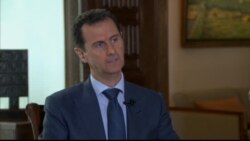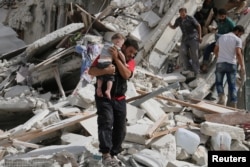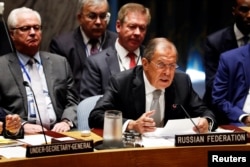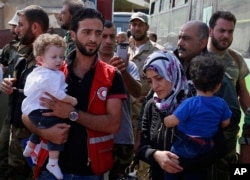Syrian President Bashar al-Assad says that the deadly civil war in his country, now in its sixth year, is going to "drag on" with no end in sight.
Assad blamed the United States, Saudi Arabia, Turkey and Qatar for prolonging the conflict with their support of insurgents trying to overthrow his government. The civil war has left hundreds of thousands of people dead and displaced millions more.
Airstrike on aid convoy
He rejected accusations Syrian or Russian fighter jets ambushed a humanitarian aid convoy, killing 20 people, Monday near Aleppo.
Assad told the Associated Press, in a rare interview with a Western news agency, Wednesday at his palace in Damascus that whatever American officials say "has no credibility" and is "just lies." Like Syria, Russia denied it hit a warehouse as aid workers unloaded cargo.
Assad also claimed that deadly U.S. air strikes on Syrian troops last week were intentional, rejecting U.S. statements they were an accident.
"It wasn't an accident by one airplane...," he said. "It was four airplanes that kept attacking the position of the Syrian troops for nearly one hour, or a little bit more than one hour. You don't commit a mistake for more than one hour."
He also blamed the United States for the near collapse of the most recent cease-fire. The Syrian leader contended the United States lacked "the will" to join Russia in fighting extremists in the country, even though the United States has for two years launched thousands of airstrikes against Islamic State targets inside Syria and in Iraq.
WATCH: Assad on cessation of cease-fire, US intentions
No idea about war's end
Assad, now in his 16th year in office after inheriting power from his father, said he has no idea when the war will end.
"When you have many external factors that you don't control, it's going to drag on and no one in this world can tell you when," he said. Assad insisted Syrian refugees who have fled the country could return within months if the United States and other foreign countries ended their support for the insurgents.
Air raids hit several rebel-held areas of Aleppo overnight Wednesday, marking the heaviest strikes the city has seen in months, just hours after U.S. Secretary of State John Kerry called for an end to warplanes flying over “key areas” of Syria.
Opposition activists immediately pointed the finger at the Syrian government, though officials have yet to comment on the reports. Heavy fighting flared up early Thursday on the outskirts of Aleppo.
Air raids in East Aleppo earlier Wednesday killed 12 civilians and presented a major challenge to the cease-fire negotiated between the United States and Russia earlier this month.
If the deteriorating cease-fire in Syria is to be salvaged, Kerry said Wednesday, warplanes must stop bombing places where humanitarian agencies are trying to deliver food and medicine. Kerry said all sides in the conflict are at "a moment of truth."
Kerry made his appeal to a high-level meeting of the U.N. Security Council, saying a limit to overflights is crucial to ending the bloodshed in Syria.
Russians dismissive
Russian Foreign Minister Sergei Lavrov, who had addressed the Security Council before Kerry, did not immediately respond to the American proposal, although his spokeswoman said later the United States was proposing "nothing ... a show."
Kerry said his aim is to "prevent Syria from doing what it has done so often in the past, which is to attack civilian targets with the excuse that it is just going after" terrorists and extremists.
Nusra and Islamic State are the two terrorist groups excluded from the truce in Syria, and the United States and Russia are supposed to be cooperating to defeat them.
Kerry said he wanted to emphasize to Russia that Washington still supports finding a diplomatic solution. “The United States continues to believe there is a way forward that, although rocky, difficult and uncertain, can provide the most viable path out of the carnage,” he said.
'Even more suffering' possible
The main Syrian opposition group, the High Negotiations Committee, welcomed Kerry's proposal "for the grounding of Syrian air forces, which are the leading killers of Syrian civilians." But spokesman Bassma Kodmani said the group is deeply skeptical of "agreements with Russia, which has shown a consistent willingness to violate deals and to flagrantly violate international law."
Kerry said those who believe the crisis in Syria cannot get any worse are “dead wrong,” and that while the current cease-fire plan is imperfect, there has not been any "remotely realistic" alternative.
"If we decide not to do what it takes to make this work, this cessation of hostilities," Kerry said, "then make no mistake, my friends, the next time we convene here, we are going to be facing a Middle East with even more refugees, with more dead, with more displaced, with more extremists, with more suffering on a greater scale. That is a certainty."
U.N. Secretary-General Ban Ki-moon also spoke at Wednesday's Security Council meeting, emphasizing the world is at a “make-or-break moment” in Syria.
“We must remain determined that the cease-fire will be revived,” he said, noting that “well over 300,000 Syrians” have been killed in the nearly six-year-long conflict.
United Nations correspondent Margaret Besheer and reporter Josh Fatzick contributed to this report.




